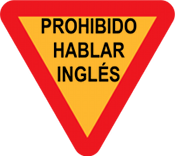
Greetings! I am Mashkioya, and I am a language nut. I am not a linguist (although admittedly, being a linguist would be pretty cool), and I don’t often use the word “polyglot” because it sounds kind of ugly, and not many people know what it means. Plus, I don’t claim to aspire to fluency in 20 languages, or anything like that. I just like to dabble, and happen to have dabbled quite a bit in this particular area. Thus, I am a language nut.
You may have heard this proverb among Latin students:
Latin is a language,
Dead as it can be.
First it killed the Romans,
And now it’s killing me!
I understand the sentiment, but instead of thinking of the languages I learn and speak as enemies out to kill me, I like to think of them as friends. Some of them I’ve been acquainted with my entire life, while others are budding relationships that I’m just beginning to explore. And each one is beautiful and unique in its own way. This post will begin a series in which I will introduce you to my language friends, one by one, and hopefully motivate you to get to know them as well, or at least to begin widening your linguistic circle in other directions. Read More
 This past month I went down to “the valley” for a week–that is, the Rio Grande Valley of south Texas and northern Mexico. Most people on the Texas side are bilingual, and I was soon exposed to that interesting phenomenon known to some as “Spanglish.” Start a sentence in Spanish, switch to English in the middle, switch back to Spanish a few phrases later. It changed my perspective a little, since before that time, I always felt a bit discouraged when Spanish speakers talked to me in English–I guess I assumed they thought I couldn’t speak Spanish very well. But hearing how they talk to each other showed me that the language switching is something they just do out of habit.
This past month I went down to “the valley” for a week–that is, the Rio Grande Valley of south Texas and northern Mexico. Most people on the Texas side are bilingual, and I was soon exposed to that interesting phenomenon known to some as “Spanglish.” Start a sentence in Spanish, switch to English in the middle, switch back to Spanish a few phrases later. It changed my perspective a little, since before that time, I always felt a bit discouraged when Spanish speakers talked to me in English–I guess I assumed they thought I couldn’t speak Spanish very well. But hearing how they talk to each other showed me that the language switching is something they just do out of habit.